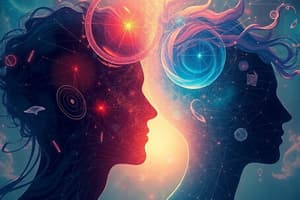Podcast
Questions and Answers
What aspect of intelligence is primarily characterized by the ability to adapt to new situations?
What aspect of intelligence is primarily characterized by the ability to adapt to new situations?
- Ability to act purposefully
- Ability to understand
- Ability to learn from experience (correct)
- Ability to think rationally
Who is recognized as the Father of psychological testing?
Who is recognized as the Father of psychological testing?
- Francis Galton (correct)
- Ivan Pavlov
- Alfred Binet
- David Wechsler
Which of the following statements about intelligence is accurate?
Which of the following statements about intelligence is accurate?
- Intelligence is an abstract ability. (correct)
- Intelligence is a completely fixed trait.
- Intelligence solely depends on genetic factors.
- Intelligence cannot be measured.
What was the primary purpose of Alfred Binet's early intelligence tests?
What was the primary purpose of Alfred Binet's early intelligence tests?
According to David Wechsler's definition, what is included in the concept of intelligence?
According to David Wechsler's definition, what is included in the concept of intelligence?
Which of the following best describes individual differences in psychology?
Which of the following best describes individual differences in psychology?
When did studies on individual differences and human abilities begin to emerge?
When did studies on individual differences and human abilities begin to emerge?
Which ability is NOT typically associated with intelligence as defined in psychology?
Which ability is NOT typically associated with intelligence as defined in psychology?
What is the formula for calculating IQ?
What is the formula for calculating IQ?
Which of the following is NOT classified as one of the primary mental abilities proposed by Thurstone?
Which of the following is NOT classified as one of the primary mental abilities proposed by Thurstone?
Who first developed intelligence tests for assessing children's needs?
Who first developed intelligence tests for assessing children's needs?
According to Thorndike, which type of intelligence relates to understanding ideas and symbols?
According to Thorndike, which type of intelligence relates to understanding ideas and symbols?
The concept of mental age refers to:
The concept of mental age refers to:
Which of the following statements is true regarding Gardner's theory of multiple intelligences?
Which of the following statements is true regarding Gardner's theory of multiple intelligences?
What does 'perceptual speed' refer to in primary mental abilities?
What does 'perceptual speed' refer to in primary mental abilities?
Which ability is NOT associated with social intelligence?
Which ability is NOT associated with social intelligence?
Which intelligence involves the ability to analyze information and create products using language?
Which intelligence involves the ability to analyze information and create products using language?
What is the primary ability associated with spatial intelligence?
What is the primary ability associated with spatial intelligence?
Which of the following intelligences focuses on the ability to distinguish among types of plants and animals?
Which of the following intelligences focuses on the ability to distinguish among types of plants and animals?
What distinguishes inter-personal intelligence from intra-personal intelligence?
What distinguishes inter-personal intelligence from intra-personal intelligence?
Which intelligence is related to solving abstract problems and developing proofs?
Which intelligence is related to solving abstract problems and developing proofs?
Study Notes
Individual Differences
- The concept refers to the enduring psychological traits that set individuals apart and contribute to their unique identities.
- Examples include personality, intelligence, and emotional tendencies.
Historical Perspective on Individual Differences and Human Abilities
- Studies on human abilities didn't begin until the late 19th century.
- Francis Galton played a crucial role in the early stages of psychological testing, coining "mental test" and developing methods for measuring intelligence and ability.
- Alfred Binet's work on intelligence testing gained practical significance in the early 20th century.
- Binet was commissioned by the French government to identify intellectually challenged children in schools. He introduced the concept of "mental age", defining a set of abilities expected at specific ages.
What is Intelligence?
- Intelligence is a multifaceted construct that includes the ability to think, adapt to new situations, learn from experiences, and solve problems.
- David Wechsler defines intelligence as the "aggregate or global capacity of the individual to act purposefully, to think rationally, and to deal effectively with his/her environment."
- Key aspects of intelligence include understanding, learning, purposeful action, rational thinking, and the ability to adjust to change.
IQ (Intelligence Quotient)
- The term "intelligence quotient" or IQ was coined by German psychologist William Stern, originating from the work of Alfred Binet.
- Binet's intelligence tests were designed to identify children needing additional academic support.
- IQ is defined as the ratio between mental age and chronological age: IQ = (MA/CA) * 100
- Mental age is determined by performance on intelligence tests, while chronological age is simply age since birth.
Primary Mental Abilities
- Psychologist Louis L. Thurstone identified seven primary mental abilities:
- Associative memory
- Numerical ability
- Perceptual speed
- Reasoning
- Spatial visualization
- Verbal comprehension
- Word fluency
Intelligence Types
- Edward Thorndike categorized three intelligence types:
- Social intelligence: The ability to understand and manage social interactions effectively.
- Concrete intelligence: The intelligence associated with understanding and interacting with tangible objects and materials.
- Abstract intelligence: The ability to grasp and manipulate abstract concepts, such as ideas, symbols, principles, laws, and formulas.
Gardner's Theory of Multiple Intelligences
- Howard Gardner proposed the theory of multiple intelligences, suggesting that intelligence is multifaceted and not solely measured by traditional IQ tests.
- Gardner identified eight intelligences:
- Linguistic
- Logical-mathematical
- Spatial
- Musical
- Naturalist
- Bodily-kinesthetic
- Interpersonal
- Intrapersonal
Studying That Suits You
Use AI to generate personalized quizzes and flashcards to suit your learning preferences.
Related Documents
Description
Explore the enduring psychological traits that define individual differences and contribute to unique identities. This quiz covers key historical perspectives on human abilities and intelligence, highlighting the contributions of Francis Galton and Alfred Binet in psychological testing and measurement. Test your knowledge on how intelligence is defined and measured.



